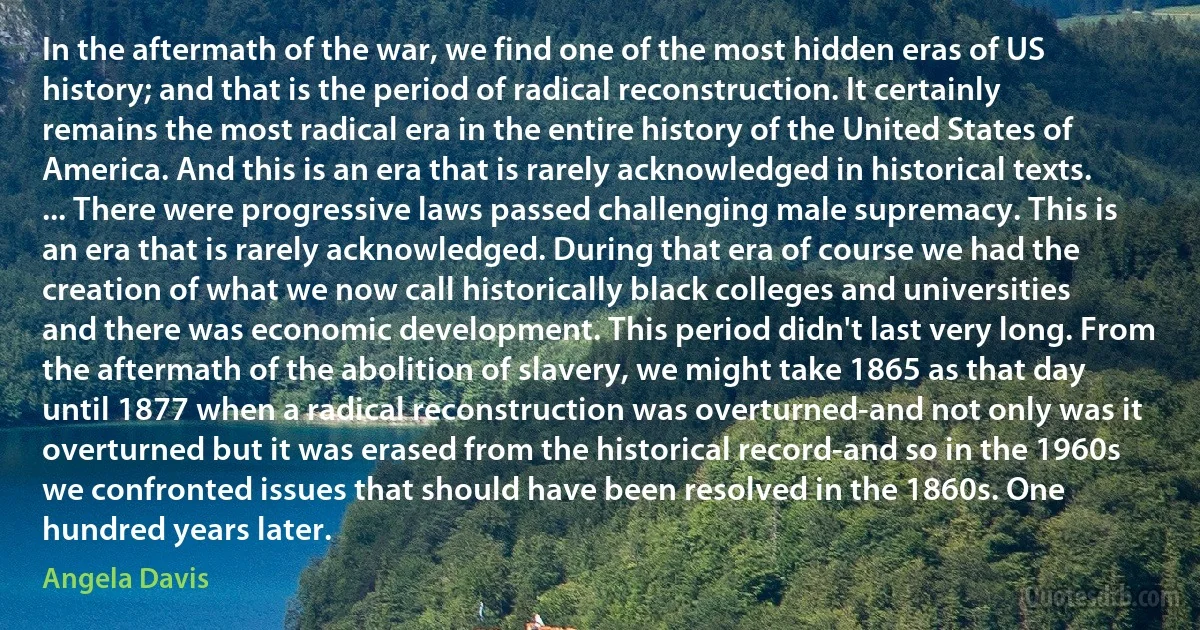
In the aftermath of the war, we find one of the most hidden eras of US history; and that is the period of radical reconstruction. It certainly remains the most radical era in the entire history of the United States of America. And this is an era that is rarely acknowledged in historical texts. ... There were progressive laws passed challenging male supremacy. This is an era that is rarely acknowledged. During that era of course we had the creation of what we now call historically black colleges and universities and there was economic development. This period didn't last very long. From the aftermath of the abolition of slavery, we might take 1865 as that day until 1877 when a radical reconstruction was overturned-and not only was it overturned but it was erased from the historical record-and so in the 1960s we confronted issues that should have been resolved in the 1860s. One hundred years later.
Angela DavisRelated topics
abolition black call challenging course day development entire era find hide historical history hundred last later male might now progressive reconstruction should supremacy take war remains 1960s years Laws StatesRelated quotes
No one, who knows what the difficulties are, now believes that the crisis of physics is likely to be resolved by any simple trick or modification of existing theories. Something radical is needed, and it will have to go far wider than physics. A new world outlook is being forged, but much experiment and argument will be needed before it can take a definitive form. It must be coherent, it must include and illuminate the new knowledge of fundamental particles and their complex fields, it must resolve the paradoxes of wave and particle, it must make the world inside the atom and the wide spaces of the universe equally intelligible. It must have a different dimension from all previous world views, and include in itself an explanation of development and the origin of new things. In this it will fall naturally in line with the converging tendencies of the biological and social sciences in which a regular pattern blends with their evolutionary history.

John Desmond Bernal
So David outside of gay and lesbian issues, first of all no one should get fired because they are gay or lesbian period. But when you set these laws up my experience with these laws are you create a protected class. And I speak as someone who started a one man handyman business in Albuquerque in 1974 and grew it to over a thousand employees... I'll tell you because of our laws that we passed on safety issues that this whole notion of whistle blower legislation it sounds great but the reality is... employees that were horrible declared themselves to be whistle blowers in the safety category or they declared themselves an alcoholic because of legislation [feedback] the American for Disabilities Act... I want that person who breaks a window breaks a windshield with a rock prosecuted on the basis that they threw a rock through a windshield not because they were motivated by hate.

Gary Johnson
A Chinaman can ride in the same passenger coach with white citizens of the United States, while citizens of the black race in Louisiana, many of whom, perhaps, risked their lives for the preservation of the Union, who are entitled, by law, to participate in the political control of the State and nation, who are not excluded, by law or by reason of their race, from public stations of any kind, and who have all the legal rights that belong to white citizens, are yet declared to be criminals, liable to imprisonment, if they ride in a public coach occupied by citizens of the white race. He does not object, nor, perhaps, would he object to separate coaches for his race if his rights under the law were recognized. But he objecting, and ought never to cease objecting, to the proposition that citizens of the white and black race can be adjudged criminals because they sit, or claim the right to sit, in the same public coach on a public highway.

John Marshall Harlan
There are two ways of considering society. According to some, the development of human associations is not subject to providential, unchangeable laws. Rather, these associations, having originally been organized in a purely artificial manner by primeval legislators, can later be modified or remade by other legislators, in step with the progress of social science. In this system the government plays a preeminent role, because it is upon it, the custodian of the principle of authority, that the daily task of modifying and remaking society devolves.According to others, on the contrary, society is a purely natural fact. Like the earth on which it stands, society moves in accordance with general, preexisting laws. In this system, there is no such thing, strictly speaking, as social science; there is only economic science, which studies the natural organism of society and shows how this organism functions.

Gustave de Molinari
There's a human race, and different skin colors, and different racial, what we call racial characteristics. There's several theories about where those come in. Probably the best theory is that the Tower of Babel, which would have been a few hundred years after the flood, is where the races began. When god confused the languages, they went off into their small groups, all speakin' the same language. And if you get a small in-breeding group, you know, 2000 years after the creation, you're gonna get genetic disorders, and racial traits could be a result of this Tower of Babel incident. But I think that there's no question from scripture and from science that all humans are the same race, and have the same genetic code, and certainly can interbreed. So there's no reason scripturally to be a racist. You know, we all came from Adam and Eve, and then later from Noah and his family.

Kent Hovind
